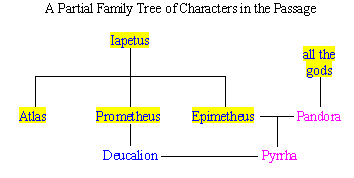|
interea repetunt caecis obscura latebris
verba datae sortis secum inter seque volutant.
inde Promethides placidis Epimethida dictis
mulcet et, "aut fallax," ait, "est sollertia nobis,
aut (pia sunt nullumque nefas oracula suadent!) 5
magna parens terra est: lapides in corpore terrae
ossa reor dici; iacere hos post terga iubemur."
coniugis augurio quamquam Titania mota est,
spes tamen in dubio est: adeo caelestibus ambo
diffidunt monitis; sed quid temptare nocebit? 10
descendunt: velantque caput tunicasque recingunt
et iussos lapides sua post vestigia mittunt.
saxa (quis hoc credat, nisi sit pro teste vetustas?)
ponere duritiem coepere suumque rigorem
mollirique mora mollitaque ducere formam. 15
Ovid, Metamorphoses 1.388-402
Click here to read the beginning of the story.
(Excerpt from Ovid available online here: Book 1.)
1. Which of the following words does not suggest
the difficulty in interpreting omens?
caecis (line 1)
obscura (line 1)
latebris (line 1)
sortis (line 2)
2. Why does it prove helpful that Deucalion is the
son of Prometheus (line 3)?
He can create new people.
He has the gift of foresight.
He can warm the earth with fire.
He is immortal.
3. What kind of dative is nobis (line 4)?
agent
indirect object
possession
reference
4. What is the solution to Themis's cryptic oracle
(lines 6-7)?
Rocks are the bones of the earth.
The mother needs a proper burial.
The face of the earth is covered with stones.
They must place stones on the shores.
5. What is the correct translation of iacere . . .
iubemur (line 7)?
We order these to lie behind our backs.
Let us order these to be thrown behind our backs.
We are ordered to throw these behind our backs.
We were ordered to throw these behind our backs.
|

6. What is the correct scansion of the first four
feet of line 9?
dactyl-dactyl-spondee-dactyl
dactyl-spondee-dactyl-dactyl
dactyl-dactyl-dactyl-spondee
dactyl-dactyl-dactyl-dactyl
7. What is the correct translation of sed . . .
nocebit (line 10)?
but what will he try at night?
but who will try to hurt us?
but what will it hurt to try?
but how will he know to try?
8. What point may jar modern sensibilities in
quis . . . vetustas (line 13)?
The narrator does not believe the story.
We should trust the story because it is so old.
One should always require a witness to back up
extreme claims.
The narrator does not wish to test the account.
9. What happens as the couple carries out the
conditions of the oracle (lines 14-15)?
The gods' anger is abated.
The rocks change shape.
Their anxieties are relieved.
They are temporarily delayed.
10. What noun does mollita modify (line 15)?
saxa (line 13)
teste (line 13)
rigorem (line 14)
mora (line 15)
|